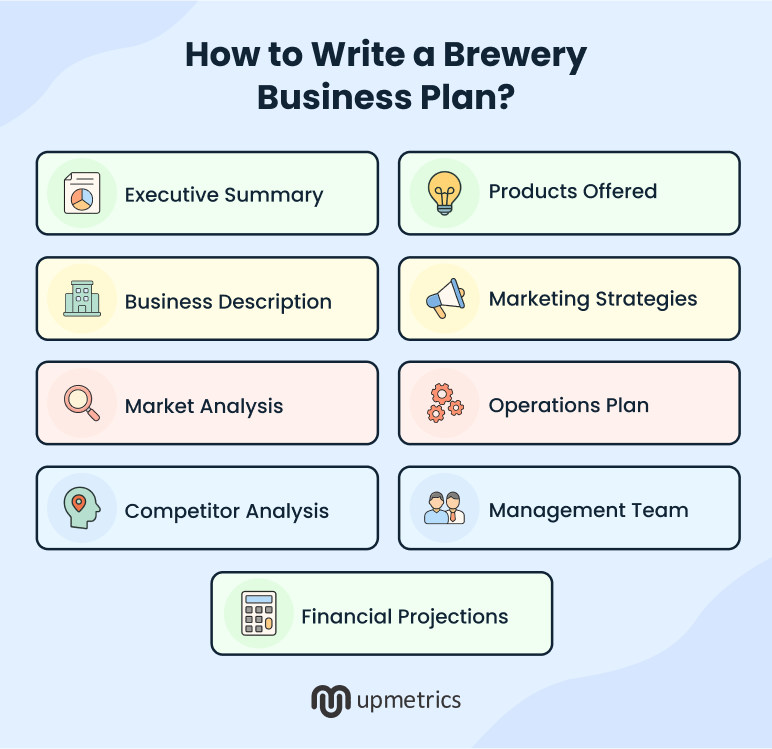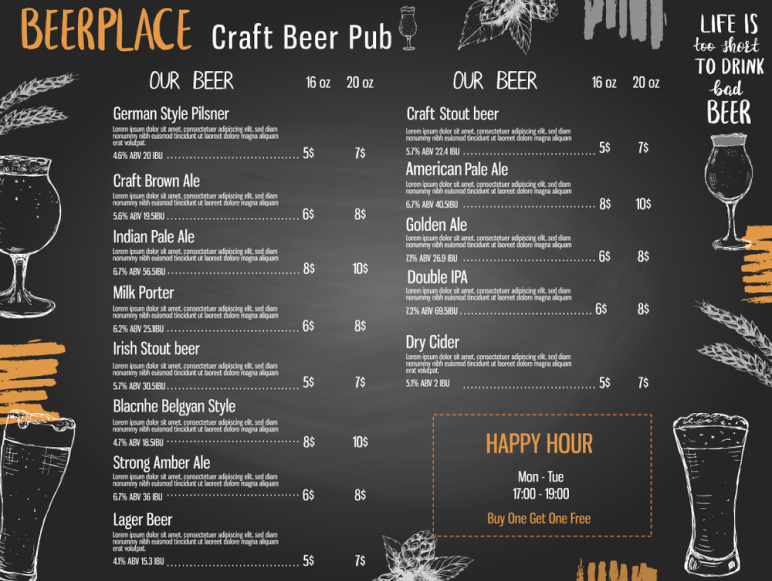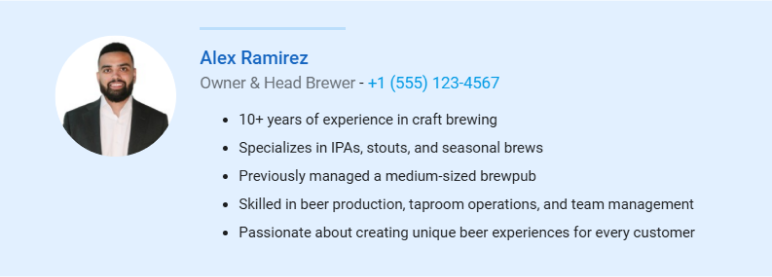Ever wondered what it takes to run a brewery people love? It’s not just about brewing great beer. You’ve got to keep the taproom buzzing, manage production, bring in customers, and make sure the business makes money.
Doing all that without a plan? That’s a recipe for stress. A clear, simple plan keeps things organized, helps your brewery run smoothly, and sets you up to grow.
That’s why we made this free brewery business plan template. It walks you through everything—from your beers and services to marketing and growth strategies—so you can keep customers coming back and run your brewery like a pro.
Download it now and grab a ready-to-use framework for building a brewery plan that actually works.
Keep reading for tips on creating a plan investors will take seriously.
Why do you need a business plan for your brewery?
If you enjoy brewing beer and want to start your own brewery, you might ask, “Do I really need a business plan?”
The answer is “yes”.
A business plan is very important if you want your brewery to work well.
Here’s why:
Helps you plan better
A business plan makes you think about how your brewery will run. You’ll write down what beers you’ll make, how much to charge, and how you’ll sell. This way, you’re prepared instead of guessing.
Makes it easier to get funding
If you want a loan, investors, or partners, they’ll want to see a plan. It shows you’ve thought things through and are serious. This makes people trust that your brewery can succeed.
Keeps you on track
Your plan is not just for the start. You can use it as your brewery grows to see if you meet your goals, control spending, and plan new beers or more staff.
Finds problems early
When writing your plan, you may notice issues—like needing more space, better delivery, or extra help. It’s better to see this early than later.
In short, a business plan helps you stay organized, plan ahead, and show that your brewery idea can work.
Now, let’s move on to how you can write a clear and effective plan.
How to write a brewery business plan?
An effective brewery business plan explains what your business does and how it plans to succeed.
Here’s a simple 9-step guide to help you put together a strong plan for your brewery business:

1. Executive Summary
A great brewery starts with more than just good beer—it starts with a strong idea. Your executive summary is where you put that idea into words. It’s the first section of your business plan, but usually the last one you’ll write, once all the other sections are finalized.
This section gives readers a quick snapshot of your entire plan, so they quickly understand your brewery concept. Think of it as the “preview” for your business plan—short, clear, and engaging, usually one to two pages long.
In this section, you’ll introduce your brewery and highlight the essentials:
- Brewery name and location
- Styles of beer and other beverages you’ll produce
- Mission and vision statement
- Target customers and the market demand
- Unique selling points
- Financial outlook
If someone only reads this part, they should still know what your brewery does, the opportunity you’re chasing, and how you plan to grow.
Keep the tone friendly, positive, and simple—the goal is to give a clear picture and make a strong first impression.
Say goodbye to boring templates
Build your business plan faster and easier with AI
Plans starting from $14/month

2. Business Description
Every brewery has a story, and this is where you share yours. This section explains what your brewery is all about, where it’s located, and what you want to achieve.
Here’s what to include in this section:
Business introduction – Say your brewery’s name, location, and its legal type (like sole owner, LLC, or partnership). For example: “Our brewery is called Sunrise Brewing. It’s located in Denver, Colorado, and is registered as an LLC.”
Mission and vision statement – Write a short mission statement that explains what your brewery wants to do. Then, write a vision statement that explains what you aim to achieve in the future.
History (if any) – If you’re already running a brewery and have experience in brewing or working in the food, drinks, or hospitality industry, add those things here.
Goals – Share your short-term and long-term goals for your brewery:
- Short-term goals could be finishing your setup, making your first beers, and opening your doors.
- Long-term goals might be selling beer in more places, adding new flavors, or opening another location.
Adding a detailed business overview section helps people quickly understand what your brewery is, what you’ve done, and where you’re heading. Keep it clear and simple.
3. Market Analysis
Before opening a brewery, it’s important to understand the beer industry and what customers want. The market analysis section shows that you know your customers and the opportunities in the market.
Here’s what you need to include in this section:
Industry overview
Start with the overall beer and craft brewing industry. How big is it? Is it growing? Share a fact to show an opportunity. For example:
“The global beer market is projected to grow from $882.80 billion in 2025 to $1,167.47 billion by 2032.”
Target market
Think about who will buy your beer and what they want:
| Customer type | What they want |
|---|---|
| Local residents & beer lovers | Good craft beer and a fun place to visit |
| Tourists & visitors | Taproom experiences and unique flavors |
| Bars & restaurants | Reliable craft beer supply for customers |
| Health-conscious customers | Natural or eco-friendly ingredients |
Market gaps & trends
Look at what customers like and what is missing in the market:
- People enjoy visiting taprooms to hang out.
- Customers want to try new flavors and seasonal beers.
- Many care about eco-friendly brewing.
Your brewery can stand out by offering friendly service, tasty and unique beers, local ingredients, and a welcoming taproom.
Regulatory environment
To run a brewery, you must follow certain rules and get the right licenses:
- State alcohol manufacturing license
- Local health and safety permits
- Distribution permits if you sell to stores or bars
Following these rules shows your brewery is legal, safe, and trustworthy.
In short, this section shows you understand the beer industry, your target customers, and how your brewery can meet real needs in the market.
4. Competitor Analysis
For every brewery, it’s important to know who your competitors are. Understanding other businesses in the market helps you see what they do well, what they do poorly, and how your brewery can do better and attract more customers.
Begin by listing your direct competitors, like other breweries, and indirect competitors, like bars and restaurants selling craft beer.
Next, think about how your brewery is different. This could be your competitive advantage. For example, you can offer:
- Better prices than others
- Unique or seasonal beer flavors
- Taproom events or experiences
- Friendly staff
If required, you can do a simple SWOT analysis. This means writing down your strengths, weaknesses, opportunities, and threats. It helps you see what your brewery does well and what challenges to watch for.
The competitor analysis section shows that you understand your competition and have a clear plan to grow your brewery successfully.
5. Products Offered
This section describes the products your brewery will offer and how you’ll provide value to customers. It also shows how your business will attract visitors and make sales.
Start with your main products:
- Different types of beer, such as lagers, ales, and stouts
- Special edition beers
- Non-alcoholic options like craft sodas or kombucha
- Merchandise (mugs, t-shirts, gift-packs)
Next, talk about beer quality. Mention if beers are made with local ingredients, organic hops, or small-batch brewing, which builds customer trust.
Then, clearly list the prices of your beers. You can sell by glass, pint, bottle, can, or in sampler packs. You can also add a menu of your brewery showing prices, for example:

Highlight any seasonal or rotating options on your menu.
Lastly, describe your services:
- Taproom experience for customers to enjoy beers on-site.
- Brewery tours to show the brewing process.
- Hosting private events or parties.
- Special events, like tastings or beer festivals.
In short, this section shows what your brewery offers, what makes your beers and services special, and how customers can enjoy them.
6. Marketing Strategies
In this section, explain your marketing approach. Share how you plan to promote your beers, reach new customers, and build loyalty for your brewery.
Here are some ways to market your brewery business:
- Create a simple website with your beers, taproom hours, and online orders.
- Share posts on Instagram, Facebook, and TikTok about beers, events, and special offers.
- Partner with local bars, restaurants, or events to reach more customers.
- Use flyers, posters, and vehicle branding to promote your brewery locally.
- Run online ad campaigns to reach more people.
After that, discuss your sales process:
- Answer customer questions quickly.
- Help visitors pick the right beer or suggest seasonal or special brews.
- Follow up with visitors who haven’t returned yet.
- Explain flavors, brewing process, or special features of beers.
- Offer discounts for first-time visitors or bundles.
A well-defined marketing plan shows you understand who your customers are and how to reach them. It should explain how you’ll promote your beers, create brand awareness, and use offers or events to bring people in—while also focusing on ways to build loyalty and encourage repeat visits.
7. Operations Plan
A clear operations plan explains how your brewery will run each day and how you’ll serve customers efficiently while staying safe and following all rules. This section shows you can handle brewing, taproom service, and deliveries smoothly.
The following are the key operational aspects to include in this section:
- Brewery setup – Space for brewing and taproom with all equipment, furniture, and storage
- Tools and systems – Brewing equipment, fermentation tracking, POS system, and inventory management
- Production & service flow – Brewing, packaging, taproom service, and fulfilling orders to bars, restaurants, or stores
- Partners – Ingredient suppliers, distributors, and event partners
- Staffing – Brewers, taproom staff, servers, and marketing help
- Compliance – Alcohol licenses, health and safety rules, and keeping records
- Growth plan – Make more beer, host events, expand taproom services, and sell to more places
In short, your operations plan shows that you can run your brewery smoothly, stay compliant, and grow successfully.
8. Management Team
The management team section explains who will run your brewery and how their skills will help it succeed. It’s your chance to show that your brewery has the right mix of brewing expertise and business know-how.
Start with yourself. If you’re the owner or head brewer, write a short intro. Include your years of experience, brewing specialties, and any leadership roles you’ve held. Mention both your brewing skills and your ability to manage a team or business.
For example:

Next, introduce other key team members:
- Brewers and assistant brewers
- Taproom staff and servers
- Administrative staff for orders and bookkeeping
- Support staff for cleaning and events
For each key staff member, mention their job title, responsibilities, skills, experience, and what they bring to the table.
You can also add a simple organizational chart to show who reports to whom. This makes it easy to see how responsibilities are divided.
If you’re working with part-time advisors or outsourced experts, mention them:
- Legal consultants for licenses and alcohol compliance
- Accounting or bookkeeping firms
- Marketing or event consultants
This shows that your brewery has the right support and expertise to run smoothly without trying to do everything alone.
9. Financial Projections
Your financial projection shows how your brewery will run and grow. It should show that you understand the costs involved and have a realistic plan to make a profit.
The following are a few key elements to include in your brewery financial plan:
Startup costs
List all the expenses you need before opening, such as:
- Lease or purchase of your brewery space
- Renovations and taproom setup
- Brewing equipment and machinery
- Licensing, permits, and insurance
- Initial ingredients for beer
- Website, marketing, and signage
Revenue streams
Your brewery can earn money from several sources:
- Selling beer in your taproom
- Selling beer to bars, restaurants, or stores
- Seasonal or special edition beers
- Merchandise like mugs, t-shirts, or gift packs
- Hosting events or brewery tours
Estimate how much beer you’ll sell and how much revenue each source will bring.
Operating expenses
List your ongoing costs. These include:
| Fixed costs | Variable costs |
|---|---|
| Rent | Ingredients |
| Utilities | Packaging |
| Insurance | Marketing & promotions |
| Staff salaries | Delivery/transportation |
| Loan/Equipment payments | Seasonal or special beers |
Financial statements
Include basic financial statements for the next 3 years:
- Income statement
- Cash flow statement
- Balance sheet
From these, calculate your break-even point—when your revenue covers all your costs.
Funding needs
If you need investment, clearly state how much and what it will be used for. For example:
- $100,000 for brewing equipment
- $50,000 for staff salaries and training
- $30,000 for marketing and licences
When writing this section, keep the language clear and avoid overly technical jargon. This section should show you understand your finances and can run a profitable brewery.
Download a free brewery business plan template
Want to write a brewery business plan but not sure where to begin? We’ve got you covered. Download our free brewery business plan template PDF to kick things off.
This investor-ready template has helped many breweries create clear and effective business plans. It’s pre-filled with examples and comes with all the key sections you need, so you can easily make it your own.
The Quickest Way to turn a Business Idea into a Business Plan
Fill-in-the-blanks and automatic financials make it easy.
Conclusion
You now have a clear picture of how to create your brewery business plan, covering everything from products and target market to strategy and financial planning. That’s a solid foundation to move forward with confidence.
Still need a bit of help? Upmetrics makes the process easier. It has an advanced AI assistant, financial forecasting features, market research tools, and 400+ customizable templates to guide you through everything.
So why wait? Start creating your brewery business plan the smart way today!



